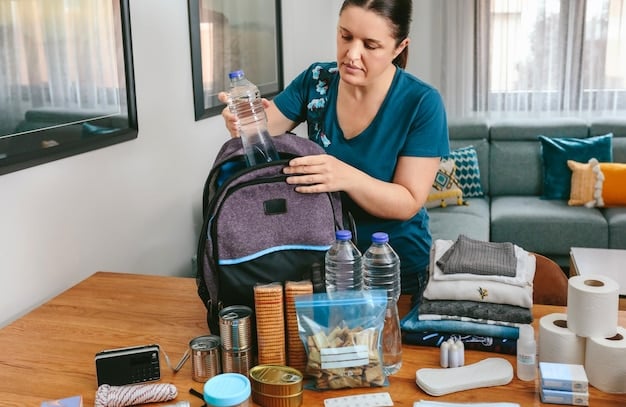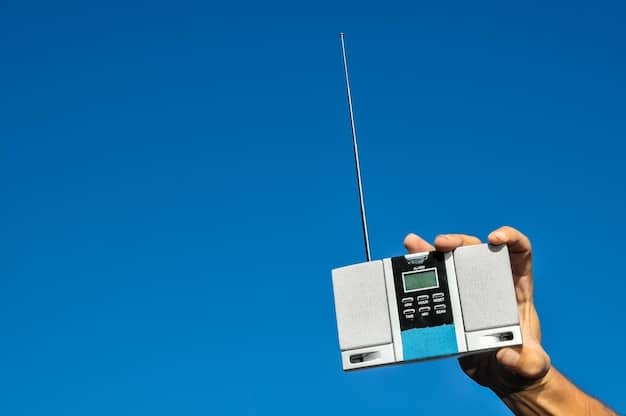Hurricane Season Prep: New Emergency Guidelines for Your Safety

New emergency preparedness guidelines have been released ahead of the hurricane season, focusing on enhanced readiness, clear communication strategies, and community resilience to ensure the safety and well-being of residents.
As hurricane season approaches, staying prepared is more crucial than ever. New emergency preparedness: new guidelines released ahead of hurricane season aim to enhance community safety and resilience.
Understanding the Updated Emergency Preparedness Guidelines
Navigating through the latest emergency preparedness guidelines can feel overwhelming. These updates are designed to improve response effectiveness, ensuring every household is better equipped to handle hurricanes.
Key Updates in the Guidelines
Here’s a breakdown of the crucial changes in the updated emergency preparedness guidelines:
The new guidelines emphasize proactive measures and improved communication strategies.
- Enhanced Evacuation Protocols: Updated evacuation routes and procedures to ensure smoother and faster evacuations.
- Improved Communication Systems: New communication channels to disseminate information effectively during emergencies.
- Strengthened Community Resilience: Initiatives to build community support networks and resilience programs.
The updated guidelines focus on fostering a culture of preparedness within communities.

These updates are designed to enhance individual and community readiness.
In summary, understanding these updates is crucial for ensuring your family’s safety and preparedness during hurricane season.
Creating Your Comprehensive Hurricane Preparedness Plan
Having a well-thought-out hurricane preparedness plan is essential for protecting your loved ones and your property. A comprehensive plan covers all bases, from stocking supplies to securing your home.
A solid plan is your best defense against the unpredictable nature of hurricanes.
Essential Components of a Hurricane Plan
Every robust hurricane preparedness plan should include these key elements:
Make sure your plan addresses all potential scenarios to ensure your safety.
- Emergency Kit: A well-stocked kit containing water, food, first aid, and essential supplies.
- Evacuation Route: A pre-planned route to a safe location during an evacuation.
- Communication Plan: A strategy for staying in touch with family members during and after the storm.
Having a detailed plan can significantly reduce stress during a hurricane.
In conclusion, a comprehensive hurricane preparedness plan is a cornerstone of your safety strategy, providing you with the tools and knowledge to weather the storm effectively.
Assembling Your Essential Emergency Supply Kit
An emergency supply kit is a vital component of hurricane preparedness, providing you with the necessary resources to sustain yourself and your family during and after a storm. Knowing what to include can make all the difference.
A well-stocked kit is your lifeline during a hurricane.
Your emergency kit should include a variety of essential items to meet your needs.
- Water: At least one gallon per person per day for several days.
- Food: A supply of non-perishable food items to last for several days.
- First Aid Kit: A comprehensive kit with essential medical supplies.
Regularly check and update your kit to ensure items are fresh and functional.
Additional Items for Your Kit
Consider including these additional items to enhance your preparedness:
These items can provide extra comfort and security during a hurricane.
- Flashlight: A reliable flashlight with extra batteries.
- Battery-Powered Radio: To stay informed about weather updates and emergency broadcasts.
- Personal Hygiene Items: Soap, hand sanitizer, toilet paper, and other hygiene products.

In summary, a well-assembled emergency supply kit is essential for ensuring your comfort and safety during a hurricane.
Understanding Evacuation Orders and Routes
During a hurricane, evacuation orders are issued to protect residents from dangerous conditions. Knowing your evacuation routes and understanding the procedures are crucial for your safety.
Understanding evacuation orders and routes can save lives.
Evacuation orders are issued when local authorities determine that conditions are too dangerous.
Knowing your evacuation routes can help you reach safety quickly.
- Identify Your Route: Determine the safest and most efficient route to your designated evacuation zone.
- Stay Informed: Monitor local news and emergency broadcasts for evacuation updates.
- Prepare Your Vehicle: Ensure your car is ready with a full tank of gas and necessary supplies.
Following evacuation procedures can minimize risks and ensure a smoother evacuation.
In conclusion, understanding evacuation orders and routes is vital for making informed decisions and staying safe during a hurricane.
Securing Your Home Against Hurricane-Force Winds
Protecting your home from hurricane-force winds is a critical aspect of hurricane preparedness. Taking proactive steps to secure your property can minimize damage and safeguard your belongings.
Securing your home can prevent extensive damage from hurricane winds.
Hurricane-force winds can cause significant damage to unsecured homes.
- Board Up Windows: Cover windows with plywood or hurricane shutters to prevent breakage.
- Secure Outdoor Items: Bring inside or firmly secure any loose outdoor items, such as furniture and decorations.
- Trim Trees and Shrubs: Cut back overgrown trees and shrubs to reduce the risk of branches falling on your home.
Additional Measures to Protect Your Home
Consider these additional steps to further protect your property:
Taking these extra precautions can provide added protection against hurricane-force winds.
- Reinforce Garage Doors: Strengthen garage doors to prevent them from being blown in.
- Check Your Roof: Inspect your roof for loose or damaged shingles and make necessary repairs.
- Clear Gutters and Downspouts: Ensure gutters and downspouts are free of debris to prevent water buildup.
In summary, securing your home against hurricane-force winds can minimize damage and protect your investment.
Staying Informed During the Hurricane Season
During hurricane season, staying informed about weather updates and emergency broadcasts is critical for your safety. Access to accurate and timely information can help you make informed decisions.
Monitoring weather updates and emergency broadcasts can keep you safe.
Staying informed allows you to take appropriate action during a hurricane.
- Weather Radio: Use a weather radio to receive alerts from the National Weather Service.
- Local News: Monitor local news channels for weather updates and emergency information.
- Social Media: Follow official social media accounts of local authorities and emergency agencies.
Access to accurate information can make a significant difference in your safety.
In conclusion, staying informed during hurricane season is essential for your safety and preparedness, enabling you to make informed decisions and take appropriate action.
| Key Point | Brief Description |
|---|---|
| 🌊 New Guidelines | Updated emergency protocols for hurricane season. |
| 🎒 Emergency Kit | Stock essentials: water, food, first aid, and flashlight. |
| 🏠 Home Security | Secure windows, outdoor items, and trim trees. |
| 📢 Stay Informed | Monitor weather updates and emergency broadcasts. |
Frequently Asked Questions
▼
Essential items for an emergency kit include water, non-perishable food, a first aid kit, a flashlight, a battery-powered radio, and personal hygiene items. Don’t forget copies of important documents!
▼
Evacuation orders and routes are typically announced through local news channels, weather radios, and official social media accounts of local authorities. Familiarize yourself with your local emergency services.
▼
To protect your home, board up windows, secure outdoor items, trim trees and shrubs, reinforce garage doors, check your roof, and clear gutters and downspouts. Consider installing hurricane shutters!
▼
It’s recommended to review and update your emergency preparedness plan and kit at least twice a year, typically before the start and after the end of the hurricane season, or as needed.
▼
You can find information about local emergency preparedness resources through your city or county’s emergency management agency website, local libraries, community centers, and non-profit organizations.
Conclusion
Staying informed and prepared is your best defense against the challenges of hurricane season. By understanding the new guidelines, creating a comprehensive plan, and staying vigilant, you can ensure the safety and well-being of yourself and your loved ones.






